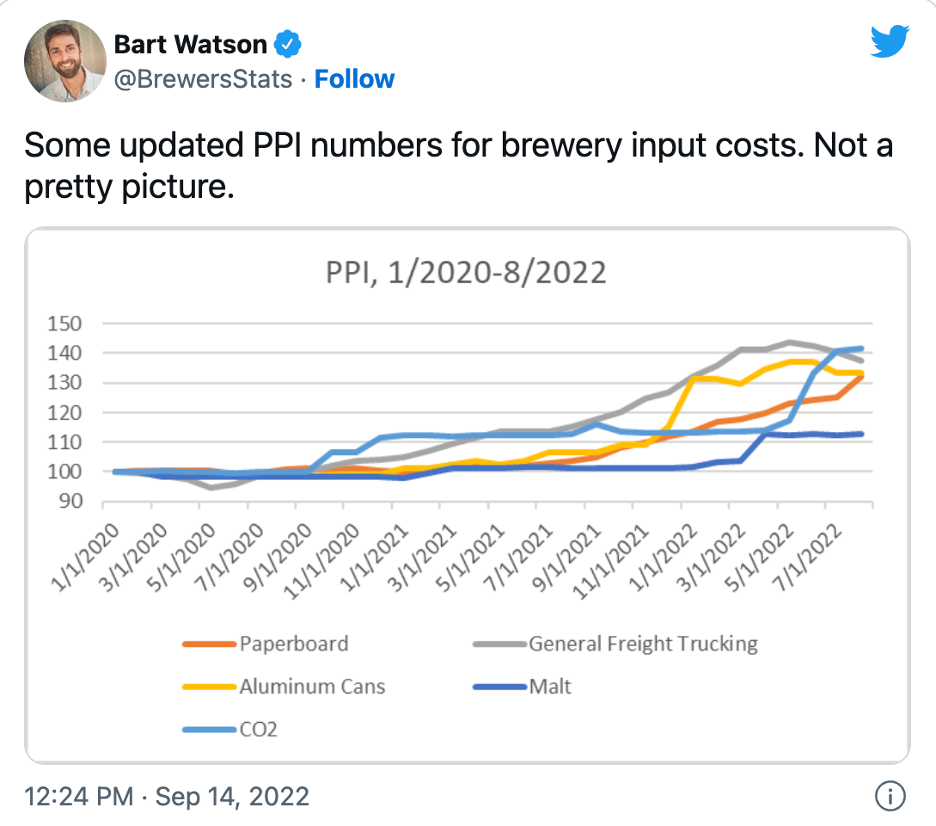With inflation and supply chain disruptions, could fresh, local craft beer be the next item to be missing from taps and the shelf? I say this tongue in cheek, but the issues with inflation and disruptions are having a major impact on the beer industry. Many manufacturers are at the point where it’s a matter of increasing prices or closing their doors.
Over the past few years, the industry has suffered some setbacks. Back in March 2020, breweries, like most other industries, closed their doors to combat the pandemic. When local leaders began lifting business restrictions, breweries were not yet allowed to open. Prolonged closures meant many breweries had to continue to pivot and incorporate curbside pick-up and direct-to-consumer deliveries as an attempt to stay viable.
Once the business restrictions were lifted for breweries, many manufacturers didn’t anticipate the shortages they were opening back up to. First, there was the aluminum can shortage that started in 2021. This forced many breweries into switching to new suppliers or signing large contracts to ensure access to this pivotal raw material to get the product to consumers when early-morning deliveries are required at many draft beer locations. Then, an increase in the price of pulp, for cardboard boxes. In 2021 there were five increases alone, and in 2022 they’ve continued to rise. Next was malt. In October 2021, the quarterly barley report came out and showed the barley crop for the year was going to be at a 30-year low. To add, the barley that was available was low in alpha and beta-amylase, the enzymes crucial to the mashing process. This is when the enzymes which the starches down into simple sugars and converts them to alcohol. Now, the industry is being affected by a CO2 shortage, leading to yet another increase to the cost of beer production.
With these increases in raw materials and input costs, along with the increases in insurance and state unemployment insurance rates, it has made it difficult for many breweries to maintain their current markets, let alone grow and expand into new markets, without assessing their profitability. Those breweries trying to hold prices at pre-pandemic levels but are having a hard time making ends meet. Bart Watson, the chair economist for the Brewer’s Association, was quoted saying “[breweries are] selling as much beer as we were pre-pandemic, but making far less on that beer, and we’re unsure how long that is sustainable.” He continued in the article saying, “What’s unprecedented is the number of areas where we are seeing challenges,”
So what are breweries doing to be able to produce, stay competitive, and also keep their doors open? Many are working to sign long-term contracts with suppliers to ensure access to limited products. These include grain, cans, cardboard, and CO2. In some cases, this means getting cans from Malaysia. In others, it means signing contracts at inflated costs to simply ensure access to supplies. Second, they’re innovating; changes to equipment to ensure a more efficient extraction of sugars from grain, building equipment to propagate yeast on site, to building out labs to ensure higher quality (instead of?). Others are making new products that take advantage of the most available fresh grains and hops to lower raw material costs. All facets of the supply chain are being assessed, and this includes maintaining some of the direct to consumer models used during the pandemic to ensure customers are getting the freshest beer possible at the best price.
Without a doubt, the beer industry is facing challenges and small local manufacturers are having to adjust, but it is also promising that the industry is consistently growing, bringing its products to more consumers than ever before.
